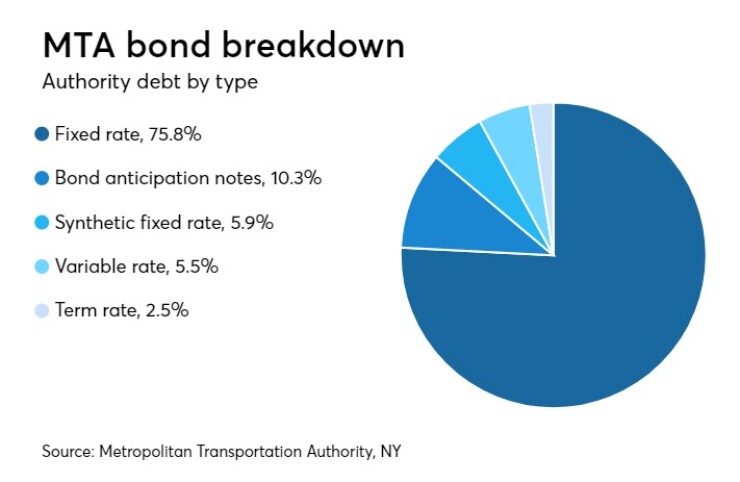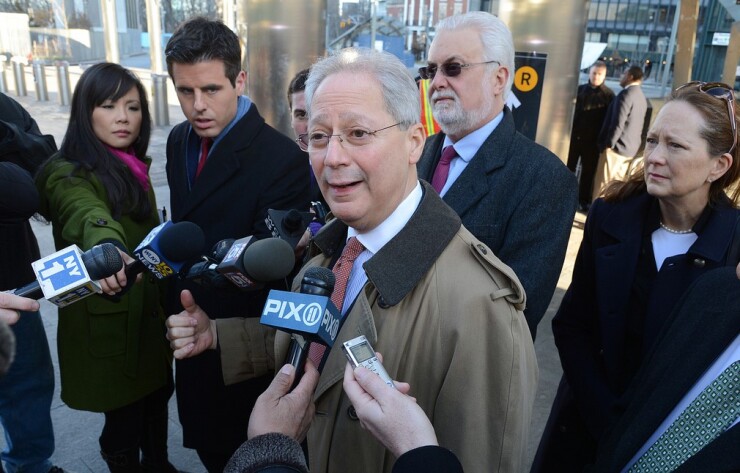As the board of New York's Metropolitan Transportation Authority delayed a vote to implement biennial fare and toll increases, big-picture debate over transit funding, performance metrics and the L-train tunnel project chaos resonated.
The board on Thursday shelved until next month consideration of two fare-hike options to February and will form a working group to examine possible revenue-generating alternatives.

The MTA is one of the largest municipal issuers with roughly $40 billion in debt. Bond rating agencies have called out the authority over its need for a reliable revenue stream.
S&P Global Ratings downgraded MTA twice last year, landing at A with a negative outlook. Moody's Investors Service in December put the authority's workhorse transportation revenue bond credit on negative watch.
Delays in the fare increases could cost the MTA an estimated $30 million monthly. Authority officials have projected a $1 billion operating deficit within three years.
The MTA's revenues are a mix of fares, grants and allocations from New York City and the state and federal governments.
"If one of those pieces falls off the table, we'll have a fiscal problem," MTA acting chairman Fernando Ferrer said after the board meeting. "It is the reason why rating agencies have kicked us in the ankles and said 'We're going to lower your bond rating.' And that has an impact on all of us, because it raises the cost of our borrowing money for capital projects."
State lawmakers expect to consider a funding package for the MTA that could include congestion pricing for vehicles entering Manhattan. Such a plan, transit advocates say, could raise $1.5 billion annually for mass transit and up to $15 billion through bonding.
Two fare-hike scenarios are under consideration. They involve keeping base fares at $2.75 and eliminating any bonus for bulk purchases, or raising base fares to $3 and raising the bonus to 10% with purchases of $6 or more. Both scenarios call for a hike in unlimited monthly MetroCards to $126.25 or $127 from $121.
Bridge and tunnel tolls were scheduled to go up from 4% to 8%.
Lawrence Schwartz, a board appointee of Gov. Andrew Cuomo and the governor's former chief of staff, wants to tie increases to improved performance metrics that could include on-time performance, fewer delays, track and car failure, and seating availability on commuter trains.
A huge uncertainty, meanwhile, hovers over whether the MTA board will vote on Cuomo's proposed changes to the $500 million repair of the Canarsie Tunnel, which carries the L train between lower Manhattan and Brooklyn and serves about 275,000 riders daily.
Cuomo three weeks ago called for a
Advocacy group Reinvent Albany has accused Cuomo of overstepping and exploiting his June 2017 declaration of emergency for the MTA. "The MTA has serious problems" it said, "but we completely doubt that the MTA’s widespread problems are the kind of short-term emergency described in state law."
The last-minute change to a project scheduled to begin in April should force the MTA to issue a new contract, according to Nicole Gelinas, a senior fellow with the Manhattan Institute for Policy Research.
"Those types of huge change orders, historically, have meant much higher costs," Gelinas said on a Bond Buyer

L-train discussion also permeated New Jersey Transit's board meeting last week.
Joe Clift, a transit advocate and former Long Island Rail Road planning director, told NJTransit's directors that this approach could work on the planned — and stalled — Hudson River tunnel project and slash the cost to $250 million from than the planned $14 billion.
"The magic of Columbia and Cornell is not only to use current technology, but to do the [cabling and benchwall] work simultaneously. They also plan to spend money on better technology, quicker technology, and you won't have to repair the benchwalls that were never damaged."





